Puzzles can be your ticket to restful sleep if you're battling anxiety-induced insomnia. They offer a gentle mental distraction, releasing feel-good chemicals and improving your mood. Start with easy puzzles solvable in 10-15 minutes, like word searches or simple Sudoku, gradually increasing difficulty. Create a consistent bedtime puzzle routine, limiting it to 15-20 minutes to avoid overstimulation. Practice mindfulness while puzzling, focusing on your breath and physical sensations. Choose technology-free options to eliminate blue light exposure. By tailoring puzzle types to your specific anxiety symptoms, you'll develop a powerful tool for managing sleepless nights. Discover how different puzzles can open up your path to peaceful slumber.
Understanding Anxiety-Induced Insomnia
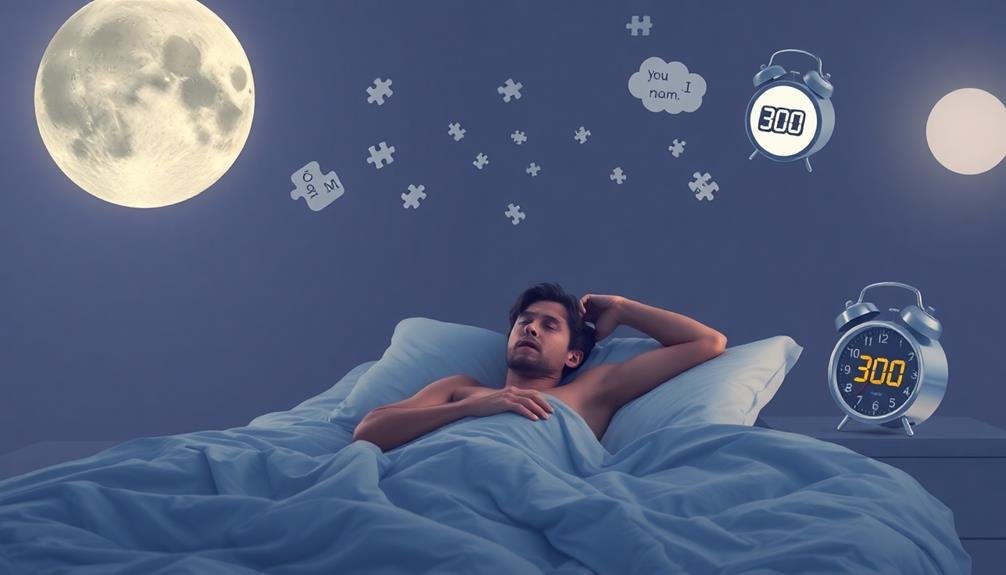
Anxiety-induced insomnia creeps up on you in the dark of night, leaving you tossing and turning with racing thoughts. Your mind becomes a whirlwind of worries, fears, and what-ifs, making it impossible to relax and drift off to sleep.
This vicious cycle can quickly spiral out of control, with each sleepless night fueling more anxiety about not getting enough rest. To break this pattern, it's vital to understand the root causes of your anxiety.
Identify specific triggers, whether they're work-related stress, personal relationships, or health concerns. Once you've pinpointed these sources, you can begin to address them head-on during the day, reducing their impact on your nighttime routine.
Developing a calming bedtime ritual can help signal to your brain that it's time to wind down. This might include gentle stretching, deep breathing exercises, or mindfulness meditation.
Avoid screens and stimulating activities in the hours leading up to bedtime, as the blue light and mental engagement can exacerbate anxiety. Instead, opt for relaxing activities like reading a book or listening to soothing music.
Benefits of Puzzles for Sleep
Three surprising benefits of puzzles can help you combat insomnia and achieve better sleep. First, puzzles provide a mental distraction, shifting your focus away from anxious thoughts that often keep you awake. By engaging in a puzzle before bed, you'll calm your mind and prepare it for rest. Second, puzzles promote a sense of accomplishment, releasing feel-good chemicals in your brain that can improve your mood and reduce stress levels.
Lastly, regular puzzle-solving can enhance your cognitive abilities, leading to better overall sleep quality. Here's a breakdown of puzzle types and their specific benefits:
| Puzzle Type | Sleep Benefit |
|---|---|
| Jigsaw | Reduces stress |
| Crossword | Improves vocabulary |
| Sudoku | Enhances logic skills |
| Word Search | Increases focus |
Selecting the Right Brain Teasers
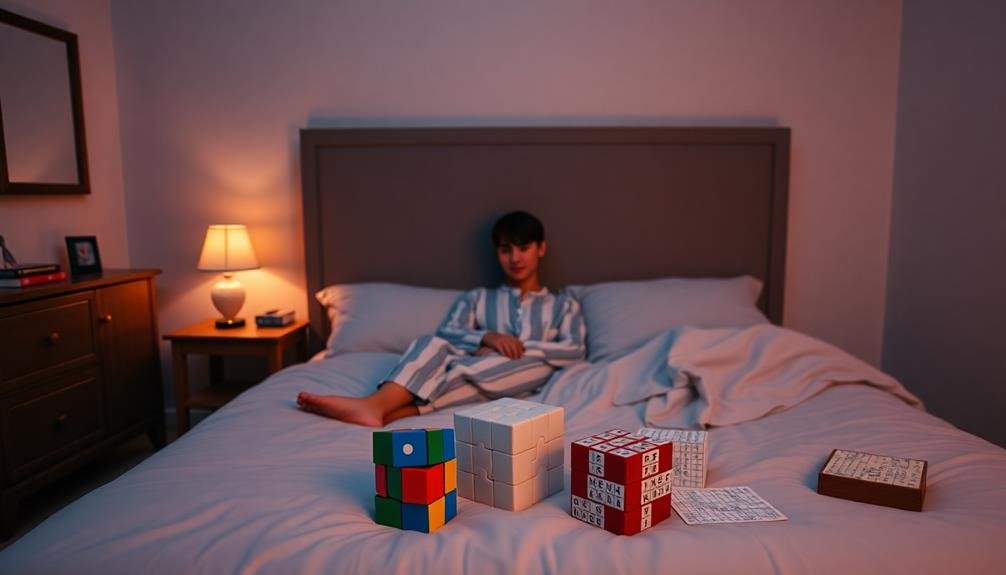
When choosing brain teasers to aid sleep, you'll want to contemplate the difficulty level carefully.
You're aiming for a sweet spot that engages your mind without overstimulating it.
Opt for puzzles that challenge you just enough to redirect your thoughts from daily stressors, but aren't so complex that they keep you awake trying to solve them.
Difficulty Level Matters
How challenging should your bedtime brain teasers be? It's essential to strike the right balance. You don't want puzzles so easy that they bore you, nor so difficult that they frustrate you and keep you awake longer.
Aim for a moderate difficulty level that engages your mind without overtaxing it. Start with puzzles you can solve in 10-15 minutes. As you become more adept, gradually increase the complexity. Sudoku enthusiasts might begin with easy grids and progress to medium or hard levels.
Crossword lovers can start with early-week puzzles and work their way up to more challenging end-of-week offerings.
Pay attention to how different difficulty levels affect your sleep. If you find yourself lying awake, mulling over an unsolved puzzle, it's a sign to dial back the complexity. Conversely, if you're breezing through puzzles without feeling mentally engaged, it's time to step up the challenge.
Balancing Challenge and Relaxation
Selecting the right brain teasers for bedtime is essential in striking a balance between challenge and relaxation. You'll want puzzles that engage your mind without overstimulating it. Opt for activities that provide a gentle mental workout rather than those that demand intense concentration or problem-solving skills.
Consider word games like crosswords or word searches, which can be both entertaining and soothing. Sudoku puzzles at an easy to moderate level can also be effective, as they require focus without being too taxing. Jigsaw puzzles, either physical or digital, offer a tactile and visual experience that can help quiet racing thoughts.
Avoid puzzles with time limits or competitive elements, as these may increase anxiety and alertness. Instead, choose open-ended activities that allow you to progress at your own pace. Memory games or pattern recognition puzzles can be particularly beneficial, as they engage cognitive functions without being too mentally demanding.
Remember to set a time limit for your puzzle-solving session. Aim for 15-30 minutes before bed, allowing your mind to wind down gradually. This approach helps shift your brain from daily stress to a calmer state conducive to sleep.
Creating a Bedtime Puzzle Routine
Three key components make up an effective bedtime puzzle routine: consistency, complexity, and time limit.
To establish consistency, choose a specific time each night to engage in your puzzle activity. This helps signal to your brain that it's time to wind down. Aim for 30-45 minutes before your desired bedtime.
For complexity, select puzzles that challenge you without causing frustration. Sudoku, crosswords, or jigsaw puzzles are excellent options. Start with easier levels and gradually increase difficulty as you become more adept. This progression keeps your routine engaging and satisfying.
Implement a strict time limit to prevent over-stimulation. Set a timer for 15-20 minutes and stop when it goes off, regardless of puzzle completion. This practice helps prevent your mind from becoming too engaged and potentially disrupting sleep.
Incorporate variety by rotating between different puzzle types throughout the week. This keeps your routine fresh and exercises various cognitive skills.
Remember to dim your lights and avoid screens during this time. If using digital puzzles, enable blue light filters on your devices.
Mindfulness Techniques While Puzzling
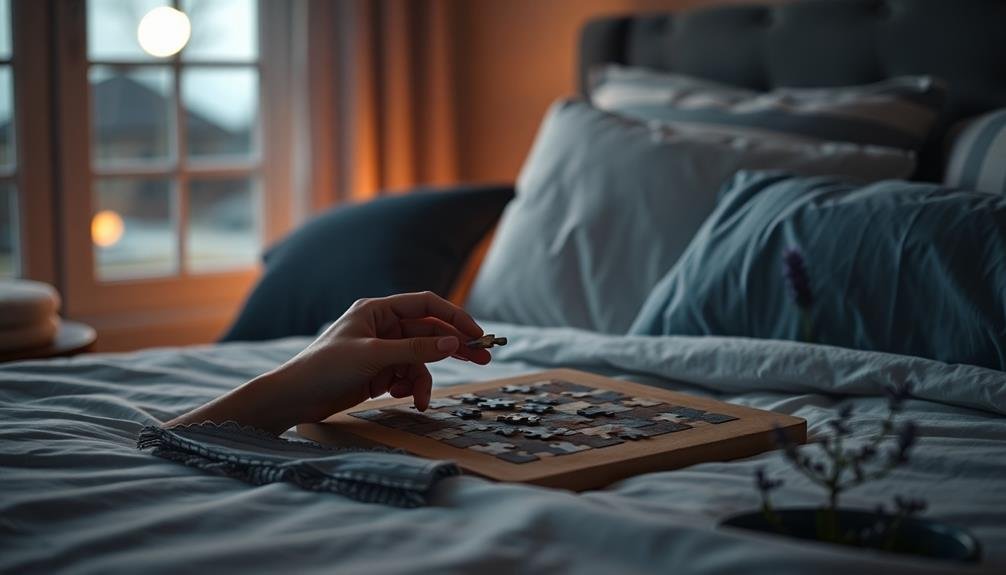
While engaging in your bedtime puzzle routine, incorporating mindfulness techniques can greatly enhance its relaxation benefits. As you work on your chosen puzzle, focus on your breath, taking slow, deep inhales and exhales. Notice the sensation of air entering and leaving your body, allowing it to anchor you to the present moment.
Pay attention to the physical sensations of puzzling. Feel the texture of the pieces in your hands, observe their colors and shapes, and listen to the soft sound they make as you move them. Engage your senses fully in the activity, letting go of any thoughts about the day or worries about tomorrow.
When your mind wanders, gently bring it back to the puzzle without judgment. Practice acceptance of any frustration or impatience that may arise, acknowledging these feelings without getting caught up in them.
As you complete each section of the puzzle, take a moment to appreciate your progress and the satisfaction it brings.
Puzzle Types for Different Anxiety
Different puzzle types can be particularly effective for various forms of anxiety. When you're dealing with generalized anxiety, jigsaw puzzles can help you focus on the present moment and calm racing thoughts.
For social anxiety, word puzzles like crosswords or word searches can provide a comforting solo activity that builds confidence in your cognitive abilities.
If you're struggling with health anxiety, number-based puzzles like Sudoku or KenKen can redirect your mind from bodily sensations to logical problem-solving.
For those with performance anxiety, strategy games like chess or Go can help you practice decision-making in a low-stakes environment.
Consider these puzzle types based on your anxiety symptoms:
- Generalized anxiety: Jigsaw puzzles, tangrams
- Social anxiety: Crosswords, word searches, anagrams
- Health anxiety: Sudoku, KenKen, logic puzzles
- Performance anxiety: Chess, Go, strategy board games
Balancing Challenge and Relaxation
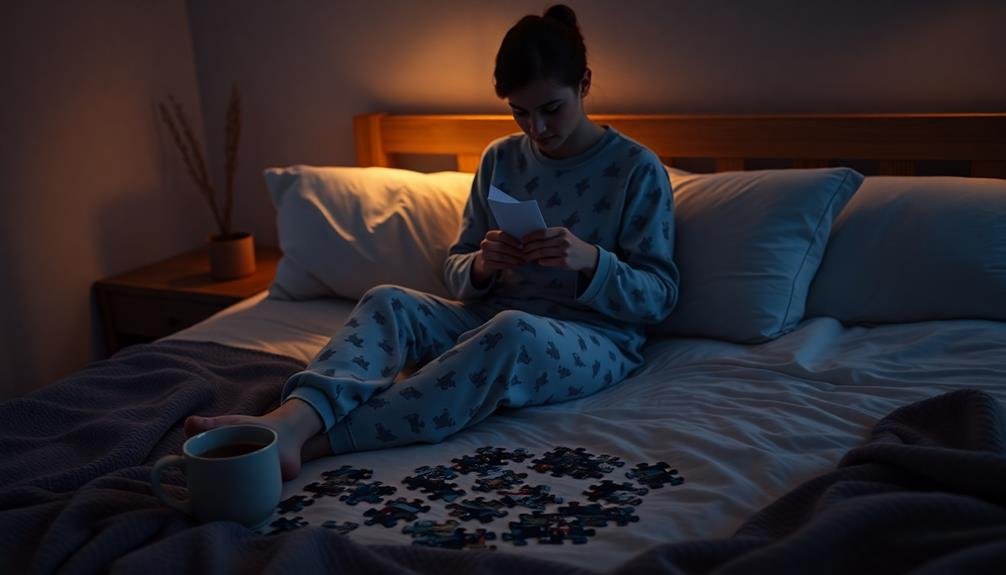
Striking the right balance between challenge and relaxation is essential when using puzzles to combat insomnia. You'll want to choose puzzles that engage your mind without overstimulating it. Start with easier puzzles and gradually increase the difficulty as you become more comfortable. This progression helps maintain interest while preventing frustration.
Pay attention to your body's responses. If you find yourself becoming tense or anxious, switch to a simpler puzzle or take a short break. Conversely, if you're breezing through puzzles without much thought, try a more challenging option to keep your mind occupied.
Remember, the goal isn't to solve the most difficult puzzles but to redirect your focus away from sleep-related anxiety. Time-based puzzles or those with strict rules might increase stress, so opt for open-ended or self-paced options. Sudoku, crosswords, and jigsaw puzzles are excellent choices as they allow you to work at your own speed.
Experiment with different puzzle types and difficulty levels to find your sweet spot. What works for others mightn't work for you, so trust your instincts and adjust accordingly.
Incorporating Technology-Free Puzzle Options
Three compelling reasons exist for incorporating technology-free puzzle options into your bedtime routine. First, they eliminate blue light exposure, which can disrupt your sleep cycle. Second, they provide a tactile experience that engages your senses differently than screens. Third, they offer a break from digital overstimulation, allowing your mind to wind down naturally.
To incorporate technology-free puzzles into your nighttime ritual, consider these options:
- Jigsaw puzzles: Start with smaller, manageable pieces to avoid frustration.
- Crossword puzzles: Choose difficulty levels that challenge but don't overwhelm you.
- Sudoku: Begin with easier grids and progress as you improve.
- Tangrams: Experiment with shapes to create various figures.
These puzzles stimulate your mind without the drawbacks of electronic devices. They're portable, allowing you to solve them in bed or a cozy corner.
You'll find that focusing on these analog activities helps quiet racing thoughts and promotes relaxation. As you engage with physical puzzles, you're creating a bridge between daytime alertness and nighttime rest.
This changeover period becomes a soothing ritual, signaling to your body and mind that it's time to prepare for sleep.
Frequently Asked Questions
Can Puzzles Replace Medication for Treating Chronic Insomnia?
While puzzles can't fully replace medication for chronic insomnia, they may help. You'll find they can relax your mind and improve sleep quality. However, it's essential to consult your doctor before changing any prescribed treatment plan.
How Long Before Bedtime Should I Stop Doing Puzzles?
You should stop doing puzzles about an hour before bedtime. This gives your mind time to wind down. If you're still feeling stimulated, try putting the puzzles away even earlier to promote better sleep.
Are There Any Puzzles That Could Worsen Anxiety or Sleep Issues?
You should avoid puzzles that are overly challenging or time-sensitive before bed. They can increase anxiety and mental stimulation. Stick to calming, low-pressure puzzles instead. If you're feeling stressed, it's best to skip puzzles entirely.
Can Children Benefit From Puzzle-Solving Before Bed for Better Sleep?
You'll find that puzzle-solving can help children sleep better. It calms their minds and promotes relaxation. However, don't choose overly stimulating puzzles. Opt for gentle, soothing activities that wind them down before bedtime. It's a great bonding opportunity too.
How Do Puzzles Compare to Reading Books for Promoting Better Sleep?
You'll find both puzzles and reading can help you relax before bed. While reading often calms your mind, puzzles may engage it more. Choose what works best for you, as individual preferences vary in promoting better sleep.
In Summary
You've now accessed a powerful tool to combat anxiety-induced insomnia. By incorporating puzzles into your bedtime routine, you're giving your mind a focused, calming activity to ease you into sleep. Remember, it's about finding the right balance of challenge and relaxation. Whether you prefer crosswords, jigsaw puzzles, or sudoku, you're creating a personalized path to better sleep. Embrace this mindful approach, and you'll soon find yourself drifting off more easily and waking up refreshed.



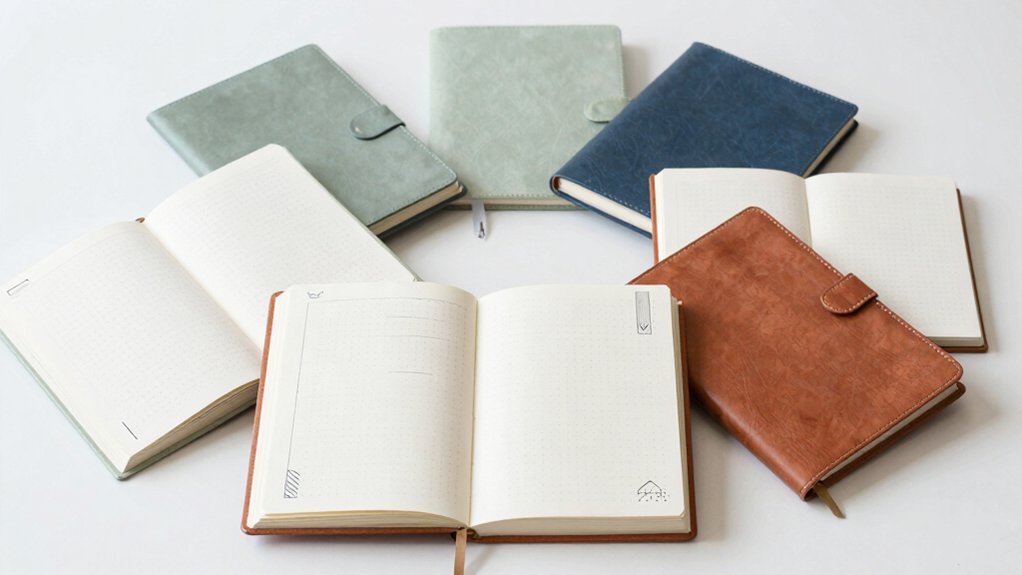
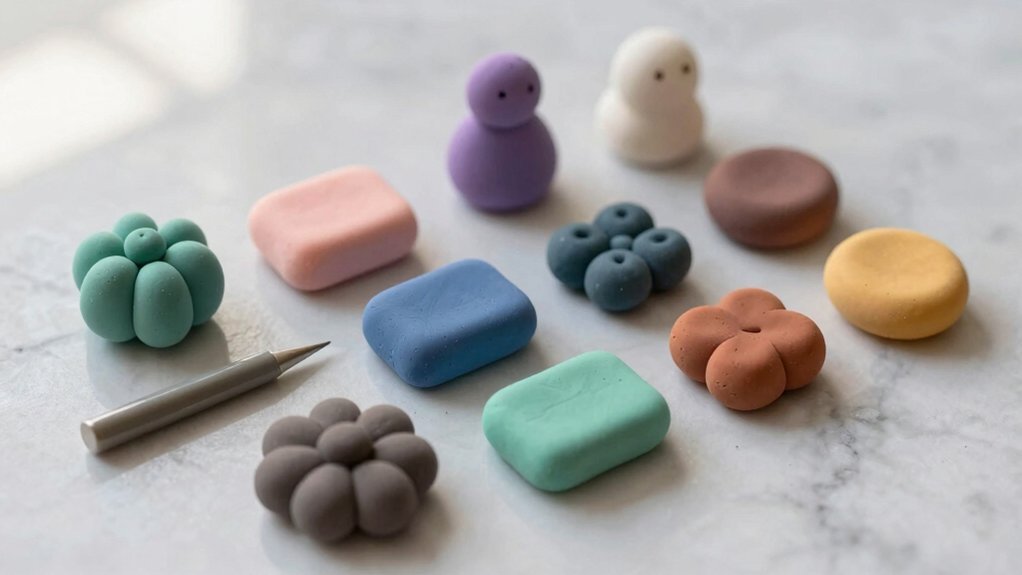
Leave a Reply